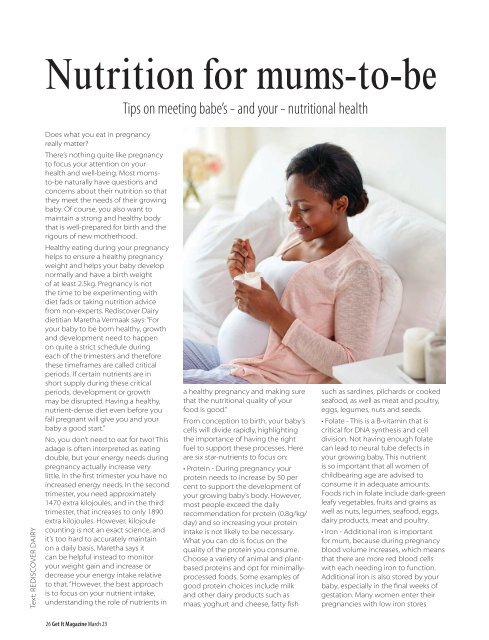Mar 23 - Pretoria
A new leaf
A new leaf
- No tags were found...
Create successful ePaper yourself
Turn your PDF publications into a flip-book with our unique Google optimized e-Paper software.
Nutrition for mums-to-be<br />
Tips on meeting babe’s - and your - nutritional health<br />
Does what you eat in pregnancy<br />
really matter?<br />
There’s nothing quite like pregnancy<br />
to focus your attention on your<br />
health and well-being. Most momsto-be<br />
naturally have questions and<br />
concerns about their nutrition so that<br />
they meet the needs of their growing<br />
baby. Of course, you also want to<br />
maintain a strong and healthy body<br />
that is well-prepared for birth and the<br />
rigours of new motherhood.<br />
Healthy eating during your pregnancy<br />
helps to ensure a healthy pregnancy<br />
weight and helps your baby develop<br />
normally and have a birth weight<br />
of at least 2.5kg. Pregnancy is not<br />
the time to be experimenting with<br />
diet fads or taking nutrition advice<br />
from non-experts. Rediscover Dairy<br />
dietitian <strong>Mar</strong>etha Vermaak says: “For<br />
your baby to be born healthy, growth<br />
and development need to happen<br />
on quite a strict schedule during<br />
each of the trimesters and therefore<br />
these timeframes are called critical<br />
periods. If certain nutrients are in<br />
short supply during these critical<br />
periods, development or growth<br />
may be disrupted. Having a healthy,<br />
nutrient-dense diet even before you<br />
fall pregnant will give you and your<br />
baby a good start.”<br />
No, you don’t need to eat for two! This<br />
adage is often interpreted as eating<br />
double, but your energy needs during<br />
pregnancy actually increase very<br />
little. In the first trimester you have no<br />
increased energy needs. In the second<br />
trimester, you need approximately<br />
1470 extra kilojoules, and in the third<br />
trimester, that increases to only 1890<br />
extra kilojoules. However, kilojoule<br />
counting is not an exact science, and<br />
it’s too hard to accurately maintain<br />
on a daily basis. <strong>Mar</strong>etha says it<br />
can be helpful instead to monitor<br />
your weight gain and increase or<br />
decrease your energy intake relative<br />
to that. “However, the best approach<br />
is to focus on your nutrient intake,<br />
understanding the role of nutrients in<br />
Text: REDISCOVER DAIRY<br />
a healthy pregnancy and making sure<br />
that the nutritional quality of your<br />
food is good.”<br />
From conception to birth, your baby’s<br />
cells will divide rapidly, highlighting<br />
the importance of having the right<br />
fuel to support these processes. Here<br />
are six star-nutrients to focus on:<br />
• Protein - During pregnancy your<br />
protein needs to increase by 50 per<br />
cent to support the development of<br />
your growing baby’s body. However,<br />
most people exceed the daily<br />
recommendation for protein (0.8g/kg/<br />
day) and so increasing your protein<br />
intake is not likely to be necessary.<br />
What you can do is focus on the<br />
quality of the protein you consume.<br />
Choose a variety of animal and plantbased<br />
proteins and opt for minimallyprocessed<br />
foods. Some examples of<br />
good protein choices include milk<br />
and other dairy products such as<br />
maas, yoghurt and cheese, fatty fish<br />
such as sardines, pilchards or cooked<br />
seafood, as well as meat and poultry,<br />
eggs, legumes, nuts and seeds.<br />
• Folate - This is a B-vitamin that is<br />
critical for DNA synthesis and cell<br />
division. Not having enough folate<br />
can lead to neural tube defects in<br />
your growing baby. This nutrient<br />
is so important that all women of<br />
childbearing age are advised to<br />
consume it in adequate amounts.<br />
Foods rich in folate include dark-green<br />
leafy vegetables, fruits and grains as<br />
well as nuts, legumes, seafood, eggs,<br />
dairy products, meat and poultry.<br />
• Iron - Additional iron is important<br />
for mum, because during pregnancy<br />
blood volume increases, which means<br />
that there are more red blood cells<br />
with each needing iron to function.<br />
Additional iron is also stored by your<br />
baby, especially in the final weeks of<br />
gestation. Many women enter their<br />
pregnancies with low iron stores<br />
26 Get It Magazine <strong>Mar</strong>ch <strong>23</strong>


















